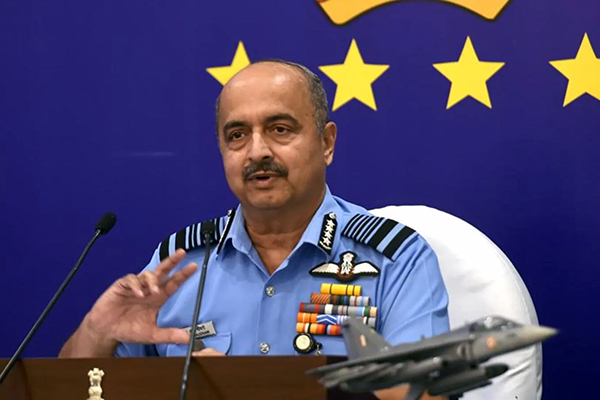
The Indian Air Force (IAF) is not against the tri-services theaterisation plan but wants to ensure that its doctrine is not compromised in any way by the proposed changes, Air Chief Marshal VR Chaudhari said on 4 October.
The model of integration adopted by India’s armed forces must be future-ready, reduce levels of decision-making and lead to an organisational structure best suited to India’s conditions and geopolitical imperatives, he told an annual news conference ahead of the Air Force Day on October 8.
Chaudhari acknowledged that the IAF has “reservations” about certain aspects of structures proposed to be created under the tri-services integration plan but made it clear the force supports the overall move to ensure synergy between the army, air force and navy.
“We are not opposing any process of integration and any process of theatre commands. We have certain reservations in respect to the structures,” he said while responding to a question on the plan for creating theatre commands by integrating assets of the three services.
“We are fully supporting the integration process, it is only the methodology and the kind of structures that need to be future-ready, is what we are insisting on,” he said. “Each service has a doctrine. The doctrinal aspects of the IAF should not be compromised in any way by the new structures.”
Chaudhari said in his opening remarks that no single service can win wars on its own and “this holds good even for the future”. He noted that air power has the “unique capability” of undertaking independent strategic operations as well as operations coordinated with sister services.
He added: “We understand the imperativeness of joint planning and execution in future wars and are keen on integrating the efforts of the three services. We believe that the model of integration that we adopt must be future-ready, it must reduce levels of decision-making and capitalise on the strength of all three services. We need an organisational structure that is best suited for Indian conditions and our geopolitical imperatives.”
The army, air force and navy currently have separate commands spread across the country. The theaterisation process aims to bring together the assets of the three services under theatre commands that will be responsible for tackling security challenges in a specified region. Such commands will be led by operational commanders.
IAF has expressed its reservations about the process in the past too.
The country’s first Chief of Defence Staff, Gen Bipin Rawat, was leading the theaterisation process but the implementation ground to a halt following his death in a helicopter crash in December last year. The process is now expected to gain pace following last week’s appointment of Gen Anil Chauhan as the new Chief of Defence Staff. In the initial stages, an air defence command and maritime theatre command will be created.
Chaudhari said IAF recently updated and revised its doctrine to remain relevant. “The next step would be to use our doctrines and well-trained manpower to evolve employment philosophies and concepts of operations. This would require joint planning and joint execution of plans,” he said.
New structures should be created while keeping in mind future challenges in the cyber and space domains, and there must be clarity in the decision-making process, he said.
Chaudhari also said the IAF is being transformed into an aerospace force. “We see space as a natural extension of the air medium and we understand the need for exploiting this domain…Space-based assets significantly enhance the potency of air power and therefore our strategy is to fully integrate our air and space capabilities to have a common picture of the aerospace medium and to enable optimum force application,” he said.
“Traditionally, wars were fought on the land, sea and in the air. Today, newer domains like cyber and space are increasingly affecting the conduct of operations even in the traditional realms,” he said. “To absorb these changes, the IAF is on the path of transformation so that we can fight and win tomorrow’s wars.”

















